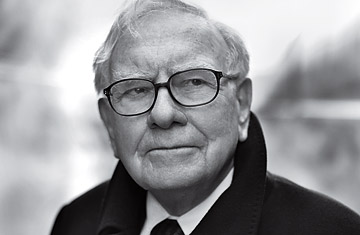
(6 of 9)
As anyone who reads the financial press knows, Buffett is a "value investor," which means that he seeks to buy companies and stocks that are selling for less than they are fundamentally worth. It's a skill he learned from his Columbia Business School professor Benjamin Graham, whose book The Intelligent Investor Buffett memorized early in his career. Value investing is a task that involves forensic examination of a company's balance sheet. It was one to which Buffett, a numbers geek who'd read every book in the Omaha public library by the age of 11 and who enjoys poring over Moody's Manuals in his spare time while eating potato chips, was well suited. Even now, he can call to mind prodigious amounts of data, from the value of the Dow in 1932 to the number of housing starts needed to equal 2006 rates.
Buffett believes that once the housing market recovers, the U.S. economy will be back on track. "Once we get back to a million housing starts per year"--the current tally is 685,000--"I think pundits will be surprised just how fast unemployment will come down in this country," he says. "There are 4 million people hitting age 22 every year in this country. Sure, you can double up on households for a while, but at some point, hormones kick in, and living with your in-laws loses its allure." Buffett notes that nearly every one of his major nonhousing businesses has had several strong quarters, and Berkshire companies are making a record number of investments, the vast majority of which are in the U.S. "I am 100% sure that people in this country will be doing more business 10 years from now than they are today."
It's easier to have a bullish view on America from Omaha, where unemployment is only 4%, family-owned businesses abound, and the economy in general was never as bifurcated as in many coastal or Rust Belt areas. But Buffett insists his optimism isn't emotional but quantitative: he focuses not on media headlines about America's inevitable decline or cheerleading about innovation and education but on the underlying data. Basic demographics favor the U.S. over nearly every other rich country in the world. And with corporate America so lean and inventories so low, the growth engine, in his view, has to kick in soon.
The numbers over the past few months have been good: jobless claims are ticking down, and consumer confidence is up. That's great news for Berkshire, since Buffett's portfolio is made up almost exclusively of large U.S. companies and American blue-chip multinationals. Even in the midst of the financial crisis and recession that followed, he remained a U.S. bull. Berkshire spent $15.6 billion in the 25 days after Lehman Brothers' September 2008 collapse, buying up many assets on the cheap. Although Berkshire lost 9.6% of its net worth in 2008, Buffett did better than most everyone else and came across as a stabilizing influence during the financial crisis, speaking out on behalf of the government's management efforts. (He wrote a "Dear Uncle Sam" thank-you letter for the bailouts to the Obama Administration in the New York Times.) "You can see what happens when you have a Plan B, as you have had in Europe, where people have dithered and been unable to come together," he notes. "I think Paulson, Bernanke, Geithner, Sheila Bair, President Bush and Obama--they all behaved magnificently."
